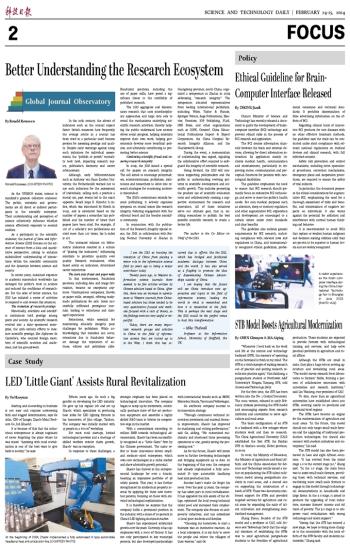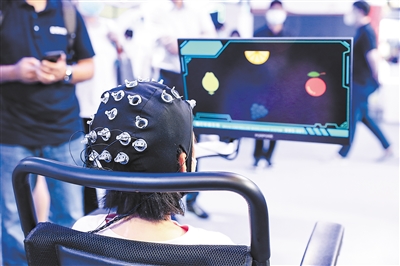
 |
| A visitor experiences the brain-computer interface during the China International Technology Fair in Shanghai in June 2023. (PHOTO: VCG) |
China's Ministry of Science and Technology has recently released a document to guide the development of brain-computer interface (BCI) technology and prevent ethical risks in the process of BCI research and application.
The BCI creates information channels between the brain and external devices, allowing for direct information interaction. Its application mainly includes medical health, communication and entertainment, particularly in improving motor, communication and perceptual functions for patients with neurological disabilities.
The guideline emphasizes the need to ensure that BCI research should primarily focus on restorative BCI technology, and serve to meet the public's health needs. For non-medical purposes such as attention, sleep or memory regulation and other augmentative BCI, exploration and development are encouraged to a certain extent under strict standards and clear benefits.
The guideline also outlines general requirements for BCI research, including compliance with relevant laws and regulations in China, and internationally recognized ethical guidelines, professional consensus and technical standards. It prohibits dissemination of false advertising information on the effects of BCI.
Regarding clinical trials of innovative BCI products for rare diseases with no other effective treatment methods, the guideline says the trials can be conducted under strict compliance with relevant national regulations on medical devices and clinical research, with full informed consent.
Safety risk prevention and control mechanisms, including strict operational procedures, correction mechanisms, emergency plans and suspension procedures, are required to ensure the safety of trial subjects.
In particular, the document proposes the ethical considerations for augmentative BCI, emphasizing the need for a thorough assessment of risks and benefits, and minimization of negative impacts on individuals. It also warns against the potential for addiction and interference with normal human thinking and behavior.
It is recommended to avoid BCIs that replace or weaken human judgment and decision-making abilities until they are proven to be superior to human levels and are widely recognized.


 Next
Next




